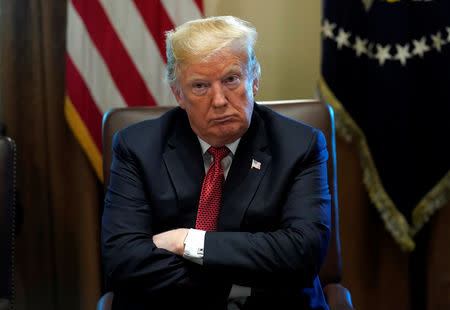Trump turns attention to budget cutting after slashing taxes

By Steve Holland
WASHINGTON (Reuters) - U.S. President Donald Trump, faced with a budget deficit at a six-year high, on Wednesday told his Cabinet to come up with proposals to cut spending by their agencies by 5 percent, but he suggested the military would be largely spared.
"I'd like you all to come back with a 5 percent cut," Trump told his Cabinet secretaries at a meeting attended by reporters.
"If you do more than that, we will be very happy. There are some people sitting at the table ... that can really do substantially more," he said.
"Get rid of the fat. Get rid of the waste."
The administration is beginning to pull together plans for the president's fiscal 2020 budget proposal, which Trump will present to Congress early next year.
As a candidate in the 2016 presidential election, Trump pledged to slash government spending, and many fellow Republicans going into Nov. 6 congressional elections have picked up the theme in their own campaigns.
But the U.S. government ended the 2018 fiscal year with a $779 billion deficit, the Treasury Department said on Monday, as Republican-led tax cuts squeezed revenues.
In an interview with Reuters, Senate Republican leader Mitch McConnell said his party would take a hard look at spending on domestic programs next year in an effort to rein in the red ink.
"We had to negotiate with the Democrats and spend more on the domestic side than I would have preferred," McConnell said of the current budget.
Asked whether the Pentagon would need to meet the 5 percent target, Trump suggested it would largely get a pass.
"We know what the new budget is for the Defense Department. It will probably be $700 billion dollars," Trump said. "It's defence. It's very important."
In August, Trump signed a $716 billion defence policy bill. A reduction to $700 billion would mark a cut of under 3 percent.
Economists expected the corporate and individual tax cuts that were signed into law late last year to balloon the federal deficit.
The deficit also widened over the past year because of more spending on interest payments on the national debt. Borrowing has increased, partly to make up for the relatively slow growth in tax revenues. Spending on the military also spiked.
Many Republicans, including Trump, have blamed the yawning deficit on other government spending and social programs.
(Reporting by Steve Holland; Writing by Lisa Lambert and Makini Brice; editing by Tim Ahmann and Tom Brown)

